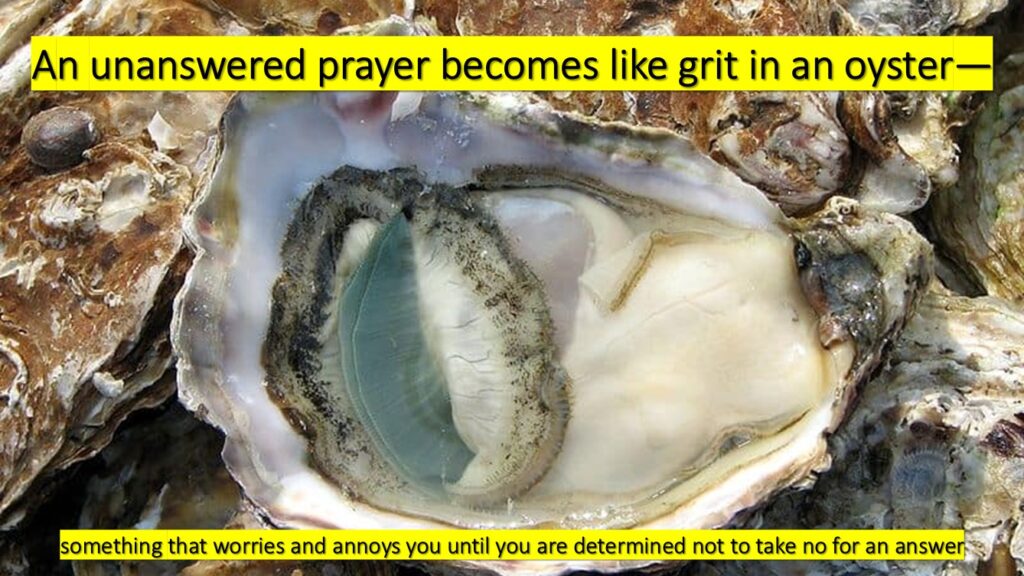This Sunday, the lectionary invites us to ponder Luke 18:1-8. The English Standard Version supplies the passage with the heading “The Parable of the Persistent Widow.”
Luke begins by telling us that Jesus used the parable to teach us that we “ought always to pray and not lose heart.”
There are two characters. A judge and a widow. A judge has power. Power to compel people to act justly, to do things which would improve the quality of the widow’s life. Like enjoying her husband’s property.
In those days, a widow, regardless of whether she was from a rich family or a poor family, had nothing. Had no rights. Was vulnerable. Was open to physical and mental assaults. Had to rely on male relatives. Her constant companions were potential poverty, isolation, and abandonment.
All she had was persistence. The power to nag. To badger. To repeatedly ask for the same thing. To ask for justice. To ask the judge to order her relatives to do justice by her, to give her what the law required of them.
God’s desires are spelt out in the Bible. Doing what God desires is called doing justice. Repeatedly, the Bible tells us what God desires for the “quartet of the vulnerable,” [1] the widows, orphans, immigrants, the poor.
Jesus told the parable to the disciples, within hearing of the Pharisees. The Pharisees whose chief concern was to observe ritual laws as closely as possible: how to dress, how to wash, what to eat. And within hearing of the crowds whose chief concern was their next meal.
Jesus’ point was that his disciples would soon join the ranks of the vulnerable. They would join their ranks as soon as he ended his journey. In Jerusalem, on a cross, as an enemy of the state.
After his crucifixion, they would become like widows. The quality of their lives would be determined by others, and by their faithfulness.
And their faithfulness would be expressed through a life of constant crying out to God and men for justice. A life of constant badgering, like the widow badgered the judge, who didn’t care about God’s desires. A corrupt judge, for Jesus says he “neither feared God nor respected men”. [2]
Was Jesus telling the disciples to badger God alone to do justice? Is that the plain meaning of “pray and not lose heart”?
Does Jesus want us to hear this parable as a graphic description only of how we are to pray and have confidence that he will respond?
I don’t think so.
I don’t think so because I’ve read the prophets and the leaders of the early church. I know they badgered both God and the earthly authorities.
They badgered God with great confidence. Through their prayers, they “showed” God that they were observing his world. And what they observed was that he seemed to be standing idle in the face of injustices.
They also badgered the authorities. They badgered them out of a belief that complying with God’s desires would result in good for all.
Their engines were driven by what they knew of God’s desires.
In the book of Acts, we read that when Paul was unjustly accused, he appealed to the Emperor. [3] In the book of Psalms and in the book of Revelation, we read of Christians and of martyrs who ceaselessly cry out “How long, O Lord,” [4] They cry out for God to lead by example!
And in the books of the prophets, we hear the prophets demanding that the powerful stop ignoring or oppressing the vulnerable. The prophets even threaten punishment on those who refuse to act justly. For example, we read in Isaiah 10:1-4 that God will cause those who deny justice to the needy to “crouch among the prisoners” or to “fall among the slain.”
What does today’s parable mean for us?
As Pope Francis said, we are to pray for the hungry and then feed them.
I like how Maggi Dawn, an Anglican theologian, professor, and priest, urges us to hear the parable.
In 2007 she wrote a reflection on today’s parable. She wrote it to mark the 200th anniversary of the ending of slavery in the British Empire, through the efforts of many, including William Wilberforce. She wrote:
“… two things emerge … One is that constant prayer shapes the person who prays. Repeated, habitual prayer gradually tests and sifts what you believe is really important and what is of ephemeral value. If something doesn’t matter that much, the momentum for prayer will diminish. But if it does matter, an unanswered prayer becomes like grit in an oyster—something that worries and annoys you until you are determined not to take no for an answer.
But the other thing that strikes me is that the widow’s story connects prayer with public action. Like Wilberforce, the widow needed justice that private prayer alone would not deliver. We aren’t called to pray passively, hoping that God will change the world on our behalf. Prayer may be the wind at our backs, but sometimes we need to track down the answer in person. As the African proverb says, “When you pray, move your feet.”
When you pray, move your feet.
Peace be with you.
[1] A term coined by the American Christian philosopher Nichola Wolterstorff.
[2] Verse 4.
[4] Revelation 6:10.
To learn more about Rama, click here.



Pingback: Mercy Over Merit: Lessons from the Pharisee and the Tax Collector – Bangsar Lutheran Church